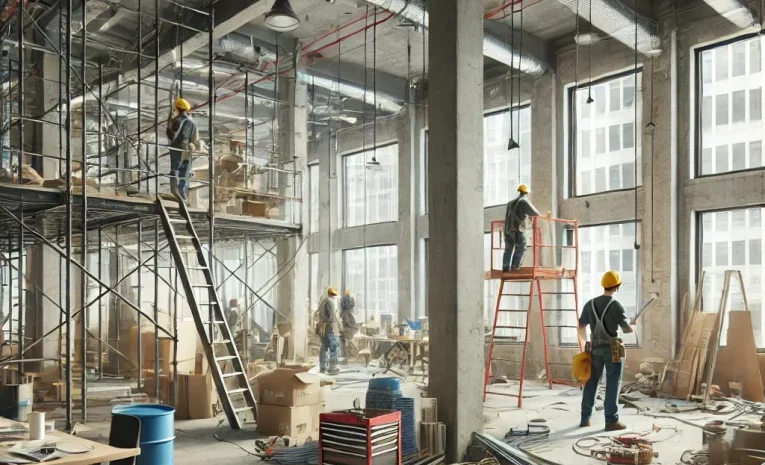
Renovating your office, opening a new location, or undergoing a major buildout can be an exciting milestone for your business. You’ve hired a contractor, plans are in place, and things are set to move forward. But before you pick out the perfect paint color or order the new furniture, there’s one thing you may have overlooked: your own insurance.
Many business owners assume that since their contractor has insurance, they’re covered too. Unfortunately, that’s not the case. While your contractor’s insurance plays an important role, it doesn’t protect you the way you might think. And when things go wrong—be it a fire, theft, or injury on-site—it’s your financial health on the line.
Let’s break down why having your own insurance is just as important as hiring the right contractor.
Contractor’s Insurance Only Goes So Far
It’s easy to assume that your contractor’s insurance will cover everything that happens during the buildout. After all, they’re the ones doing the work, right?
Yes, but that’s where it gets tricky.
Contractors typically have General Liability and Workers’ Compensation insurance. These policies are crucial for protecting their business and workers if something goes wrong, but they don’t always cover the risks you, as the business owner, are exposed to.
Take property damage, for example. If a fire starts during the renovation and damages half of your building, the contractor’s General Liability Insurance likely won’t help you. Their policy is designed to protect them from lawsuits, not to repair your building or replace your damaged property.
That’s where Builder’s Risk Insurance comes in. It’s your safety net—protecting your building, materials, and equipment from things like fire, theft, or severe weather during construction. Without it, you’d be on the hook for costly repairs.
What’s at Risk Without Builder’s Risk Insurance?
Builder’s Risk Insurance is designed specifically for protecting a property while it’s under construction or renovation. It covers a range of potential hazards, from fire to vandalism, and even includes protection for building materials and equipment.
Here’s why it’s a game-changer:
- Fire or Weather Damage: Say lightning strikes the building mid-construction, sparking a fire. Without Builder’s Risk Insurance, you’d have to pay for repairs out of pocket.
- Theft or Vandalism: Building materials are often left on-site throughout a project. If expensive fixtures or equipment are stolen or vandalized, you’ll be responsible for replacing them unless you have Builder’s Risk coverage.
- Project Delays: Builder’s Risk Insurance can also cover “soft costs” like additional loan interest or penalties if the project gets delayed. So, if severe weather halts your progress for weeks, you won’t be left scrambling to pay extra costs out of pocket.
Contractor insurance alone simply doesn’t cover these risks, because their insurance is designed to protect them—not your building or materials.
Who’s Responsible for Materials and Property?
Another common misconception is that the contractor is responsible for everything that happens on-site, including any property or materials you’ve purchased for the buildout. In reality, the contractor’s insurance covers their tools and equipment—not yours.
For instance, if you’ve purchased new furniture, lighting fixtures, or expensive equipment and stored them at the job site, the contractor’s insurance won’t cover it if they get damaged or stolen. That’s where Inland Marine Insurance or Builder’s Risk Insurance steps in to protect the things you own and have invested in.
What Happens If Someone Gets Hurt?
Let’s say someone—whether it’s a visitor, a passerby, or even one of your employees—gets injured on-site during construction. It could be something as simple as a slip on the unfinished floor, but you could still be held liable for their injury.
General Liability Insurance is your shield here. While the contractor’s insurance might cover incidents involving their workers, it likely won’t cover injuries to anyone outside their crew. As the property owner, you could be the one facing a lawsuit.
Without General Liability Insurance, you’d be paying for legal fees, settlements, or medical bills out of your own pocket. This could quickly drain your business’s resources, even for a relatively minor injury.
Contractor Insurance Has Limits—and So Do Their Responsibilities
Even though your contractor is required to carry their own insurance, it’s important to remember that these policies have limits. And if your project involves multiple subcontractors (as most do), things get even more complicated. If a subcontractor’s insurance isn’t up to par or doesn’t cover an incident, you could be left exposed.
For example, if an electrical subcontractor causes a fire that damages part of the building, and their insurance doesn’t cover it, the financial responsibility could fall back on you.
That’s why Umbrella Insurance is another valuable tool. It provides an extra layer of protection above and beyond your regular policies, covering large claims that might exceed the limits of your General Liability or other policies.
Protecting Your Financial Investment
At the end of the day, you have a significant financial stake in your buildout. Your property, materials, and project timeline are all part of that investment. If something goes wrong—whether it’s a construction delay, a major accident, or property damage—you could be left financially vulnerable.
By ensuring you have Builder’s Risk, General Liability, and Umbrella Insurance in place, you’re not just relying on your contractor’s coverage. You’re actively protecting your business’s assets, timeline, and overall success.
Meeting Legal and Contractual Requirements
It’s also worth noting that many lease agreements or lenders will require you to carry your own insurance during construction. Builder’s Risk Insurance is often a condition for securing a lease or loan, and even if the contractor has their own coverage, you’re still responsible for meeting these obligations.
Don’t wait until the paperwork is signed to realize your insurance portfolio is incomplete.
The Bottom Line: Don’t Leave Your Buildout Exposed
Contractors are a crucial part of any buildout, but don’t make the mistake of assuming their insurance covers everything. As the business owner, you need to protect your property, your materials, and your financial investment.
Having your own Builder’s Risk Insurance, General Liability Insurance, and Umbrella Insurance ensures that you’re covered—no matter what happens during the project. It’s peace of mind that allows you to focus on what matters: building the best possible space for your business’s future.




